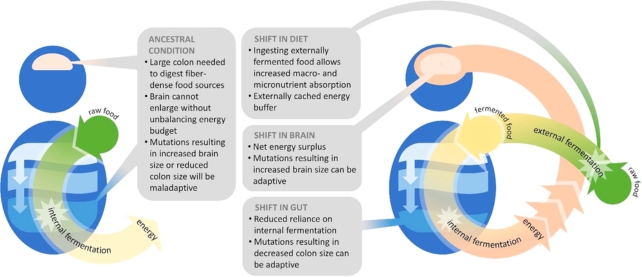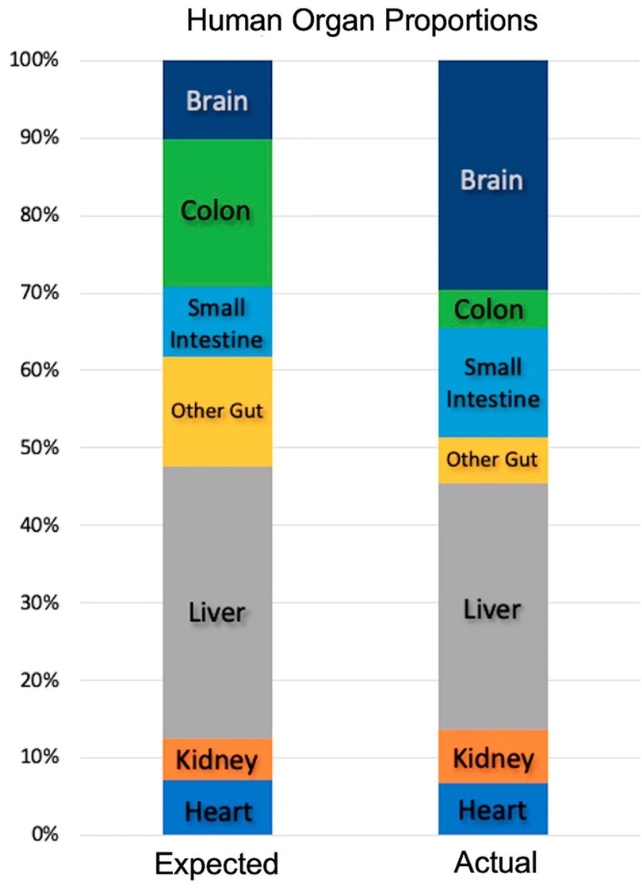Products You May Like
Researchers propose that a taste for fermented morsels may have triggered a surprising jump in the growth rate of our ancestors’ brains.
In fact, a shift from a raw diet to one that included food items already partially broken down by microbes may have been a crucial event in our brain’s evolution, according to a perspective study by evolutionary neuroscientist Katherine Bryant of Aix-Marseille University in France and two US colleagues.
Human brains have tripled in size over the last two million years of evolution, while human colons have shrunk by an estimated 74 percent, suggesting a reduced need to break down plant-derived food internally.
We know the timeline and extent of human brain expansion, but the mechanisms allowing energy to be directed to this expansion are more complex and somewhat debated.
The study authors lay out their “external fermentation hypothesis” which shows our ancestors’ metabolic circumstances for selective brain expansion may have been set in motion by moving intestinal fermentation to an external process, perhaps even experimenting with preserved foods not unlike the wine, kimchi, yoghurt, sauerkraut, and other pickles we still eat today.

The human gut microbiome acts like a machine for internal fermentation, which boosts nutrient absorption during digestion. Organic compounds are fermented into alcohol and acids by enzymes, usually produced by the bacteria and yeasts that live in parts of our digestive system such as our colon.
Fermentation is an anaerobic process, meaning it doesn’t require oxygen, so similar to the process in our guts, it can occur in a sealed container. The process produces energy in the form of adenosine triphosphate (ATP), which is an essential source of chemical energy that powers our metabolism.
The researchers argue it’s possible that culturally passed-down ways of handling or storing food encouraged this function to be externalized.
Externally fermented foods are easier to digest and contain more available nutrients than their raw equivalents. And since there’s less for the colon to do if the food is already fermented, the organ’s size could reduce over time while still potentially leaving energy available for brain growth.
The brain sizes of our ancestors, the Australopiths, were similar to those of chimpanzees (Pan troglodytes) and bonobos (Pan paniscus). The human lineage’s brain expansion accelerated with Homo‘s emergence and continued through Homo sapiens and Homo neanderthalensis.
How did our ancestors, with brains about the size of chimpanzees, manage to harness the power of external fermentation?
Bryant and her team suggest that hominids with lower cognitive abilities and smaller brains may have adapted to fermentation much earlier than proposed alternative alternative explanations for this gut-to-brain energy redirection, like animal hunting and fire-based cooking.

Fermentation has many advantages associated with cooked foods, such as softer textures, increased caloric content, improved nutrient absorption, and defense against harmful microorganisms.
It only needs simple storage spaces like a hollow, cave, or even a hole in the ground, and is basically a low-entry, stress-free ticket to nutritional goodness. As the researchers point out, “it can be stumbled upon rather than requiring planning and tool use.
“Hunting, scavenging from large carnivores, and fire use carry their own risks;” Bryant and colleagues write, “perhaps the risks of fermentation were more predictable and thus more reliably mitigable through individual and cultural learning.”
In addition to increasing the bioavailability of nutrients, external fermentation can also make poisonous foods edible, for example by removing cyanide from the common staple food cassava (Manihot esculenta).
“Forethought and mechanistic understanding are not requirements for the initial emergence of external fermentation,” write the researchers. “Our early ancestors may have simply carried food back to a common location, left it there, and intermittently eaten some and added more.”
Microbes from previous food items may have inoculated new food items, leading to fermentation. As brains grew larger, humans may have developed a better understanding of fermentation.
The team emphasizes the need for empirical research to support or refute their hypothesis, such as microbiological studies, comparative analyses, and genetic and genomic investigations.
“The offloading of gut fermentation into an external cultural practice may have been an important hominin innovation,” the authors conclude, “that laid out the metabolic conditions necessary for selection for brain expansion to take hold.”
The study has been published in Communications Biology.
